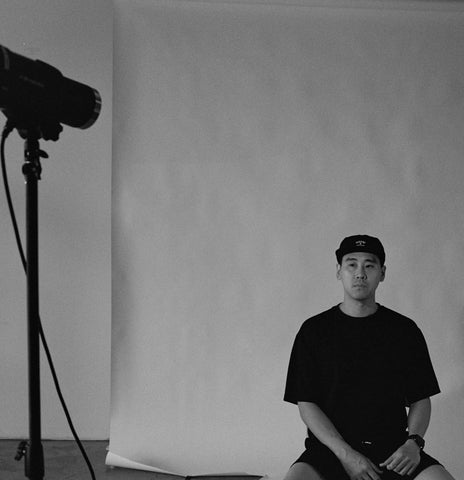
Traveler Series 03: Chi Ian Chan
Share

Growing up in Hawaii, Chi Ian Chan (Chi for short) did not live your stereotypical Hawaiian lifestyle – poke bowls and surf lessons were replaced by mom’s home cooking and skateboard sessions through the Red-Light District of Chinatown. Chi’s gritty start, passion for food, and journeys across Asia make him a perfect candidate for our Traveler Series. We recently had the opportunity to sit down with him in our Brooklyn Studio to learn more about his early life in Hawaii, why he has come to New York, and how he is building his “hanai ohana” through his new venture, Ricepress Musubi, here in NYC.
Chi, where does your story begin?
Originally hailing from Macau with ancestral roots in Hong Kong, I moved to Hawaii at a young age and spent three decades of my life on the island before making the leap to New York last year.
Your experience of Hawaii is very different from what the mainland United States pictures. Could you share more about it?
I will start with that fact that I have never been on a surfboard. Instead, I grew up on a skateboard in what would best be described as the red-light district of Chinatown. In the early 2000s, this area was full of crime, graffiti, drugs and peep shows. Thankfully, my mom took care of our home and surrounded us with great friends and family. Throughout my teens I worked just about every possible position a restaurant has to offer and had the opportunity to experience incredible multi-cultural cuisines. Living in Hawaii is unique in that the Island is small, tight knit, and very community oriented. Catering to tourists becomes our livelihood, and supporting our communities becomes a shared commitment.
Moving from Hawaii to New York after three decades must have been a significant change. What motivated your decision?
In a word – Love. Love for my life partner who lives here, love for the city’s incredible culinary scene and diverse culture, and finally, to bring the essence of Hawaii to the Big Apple through my latest venture, Ricepress Musubi.
For those unfamiliar, please enlighten us about musubi!
Musubi is a delightful fusion of two distinct cultural influences. First, it pays homage to the World War II GIs who introduced SPAM rations to Hawaii, and second, it draws inspiration from the Japanese onigiri rice ball. Although there may be differing claims regarding its official creator, we do know that a woman in the 1980s by the name of Barbara Funamura played a significant role in popularizing this dish. Musubi stands as a symbol of cultural diversity in Hawaii, nourishing locals from all walks of life, regardless of their backgrounds or incomes.
Now, let's talk about the inspiration behind your business venture, Ricepress Musubi (RPM).
RPM was created to bring a specialty SPAM musubi shop to the East Coast. Since relocating here, I have never seen a shop that serves exclusively SPAM musubi. RPM has brought a “Hawaii local boy” story with a modern twist to the iconic comfort snack. Being that Hawaii is such a small island with strong community ties, we want to bring a sense of community to not only NYC, but to our Hawaii ohana in the East Coast and beyond.
"The Hawaiian shaka has many variations, but they all mean similar things - "hello", "goodbye", “I understand, or I got it”.
In a short time, you've successfully built an incredible business and community around RPM. What is your long-term vision for the venture?
Our vision for RPM is to expand its presence beyond New York and venture into other states, eventually returning to the islands where I come from and where my partner's family resides. We aspire to franchise the RPM brand, ensuring that the SPAM musubi becomes widely recognized as an iconic Hawaiian dish. We want people to realize that this local comfort snack represents more than just a culinary delight; it signifies a community coming together for the greater good. Embracing our kuleana (responsibility), we aim to honor our Hawaiian roots by giving back to the local community and supporting fellow entrepreneurs.
And for those who want to place an order for Musubi here in NYC today, where can they do so?
For local orders simply DM us @ricepressmsubi. You can also explore our website for more info and updated menus.
Finally, circling back to your roots in Hawaii, tell us about the underground spots we should visit on our next trip.
Obake: First of its kind matcha bar at day, craft cocktail bar at night; located in the heart of Chinatown Honolulu. The list of small local owned shops continue to grow and replace the once nitty gritty with modern and innovative ideas of Hawaii locals.
Halona Beach Cove: aka Cockroach Cove between Sandy Beach Hanauma Bay. Small quaint beach with a mix of locals and visitors, exercise caution as there is no lifeguard on duty.
KJ’s Local Grindz: Best fried chicken on the windward side, hands down best mac salad on the island.
Paalaa Kai Deli: One of the best fried chicken in Haleiwa area, located next to the Paalaa Kai Bakery in Haleiwa known for the puff pastry “snow puffies”.
Mitsu-ken Okazuya: Best local garlic chicken in town. Family owned and operated since 1992; I used to go there at 5am to pick up breakfast bentos before work
Nanding’s Bakery: Inexpensive, and most importantly, delicious Spanish rolls that are covered in sweet sugar and butter.
The Row Kakaako: Low key cool and chill open air bar with lots of seating featuring many local beers and ciders, large TV’s for sporting events. P.S. You may bring your own cigars and smoke here
